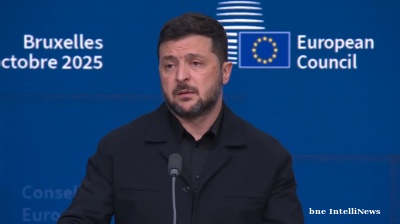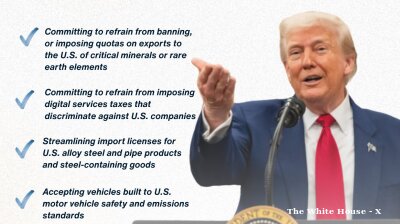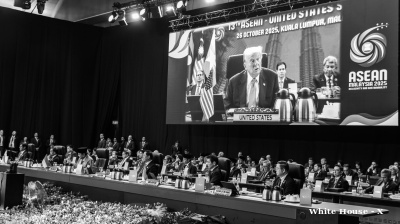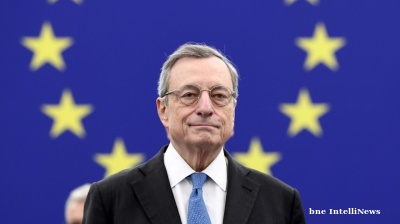Hungarian Prime Minister Viktor Orban warned on September 7 that the eurozone could face a "chaotic and costly" disintegration unless reforms were enacted, arguing that the forthcoming 2028-2035 EU budget "could be the last if nothing changes".
Speaking at the annual Civic Picnic in Kotcse in southwestern Hungary, Orban said the EU had failed to achieve its founding ambition of becoming a global political and economic power, arguing that its institutions were ill-equipped to deal with current challenges and said the euro had disappointed due to the lack of a common fiscal policy.
The Kotcse gathering is an informal meeting of centre-right intellectuals and business, political and cultural leaders, where the ruling Fidesz party prepares for the coming parliamentary year and sets the political agenda.
This year, opposition leader Péter Magyar stole the spotlight by organising a rally just a few hundred metres from the Fidesz gathering. Despite predictions from Fidesz-aligned commentators that Magyar would cause disruption, the event passed peacefully under heavy security.
Instead of confrontation, the day was defined by symbolism: while Orban and the Fidesz elite remained behind cordons and inaccessible to the press, Magyar cultivated an image of openness, trading barbs with the prime minister by likening him to a "Turkish emperor", wrote political analyst Dull Szabolcs on Facebook.
Magyar's presence in the picturesque village not far from Lake Balaton forced Fidesz to break with a long tradition, as Orban's speech was broadcast live on Facebook for the first time.
Orban proposed transforming the EU into a structure of concentric circles. In this model, an outer ring would include countries cooperating only on military and energy security — potentially including Turkey, the UK and even Ukraine. A second circle would comprise members of the common market, a third those sharing a currency, and a fourth those seeking deeper political union. Orban argued such a model was distinct from the notion of a "multi-speed Europe" and said it offered the best chance of preserving the EU for the next decade.
He argued that Brussels was using the war in Ukraine as a pretext to mutualise debt.
"A shared debt qualifies as statehood; that is how the United States came into being. In addition, they think that Ukraine is the best tool for becoming jointly indebted. We should not only see the war and geopolitics, but the future of the EU," he added.
As long as the war in Ukraine lasts, the European Union will stay "a lame duck", as it depends on the United States in terms of security, Orban said. Without US assistance, the EU was not only incapable of resolving the issue of Ukraine, but it could not even ensure its own security, he added.
He added that the establishment of parallel societies was at an advanced stage and warned that parallel legal systems would follow.
He warned that Ukraine's accession to the EU would entangle the bloc in perpetual conflict with Moscow and called instead for an EU-Russia security pact.
Orban framed Hungary's future as a choice between deeper integration with the EU or preserving its own model. He warned that aligning with Brussels would mean "heading for the abyss", entailing adoption of the euro, higher taxes, loss of regulated utility prices and family subsidies, as well as accepting shared debt and military commitments to Ukraine. By contrast, Orban said his government's "work-based" model would safeguard sovereignty, maintain Russian energy supplies, and resist EU pressure on migration and war funding.
Hungary's veteran leader announced the launch of a National Consultation on leaked tax proposals from the opposition Tisza Party, framing next year's election as a test of trust. Tisza has refuted the validity of the document and announced tax cuts on the minimum wage and a wealth levy on fortunes above HUF5bn (€13mn), but Fidesz continues to hammer home the message that households would be worse off with a Tisza government.
This is the first time Orban has launched such an initiative against a rival party's platform, signalling that discrediting Tisza is seen as Fidesz's strongest campaign weapon at present, according to analysts.
Orban accused his rivals of "secrecy and stealth" and argued that Fidesz's record of keeping promises — from expelling the IMF to resisting migration and reintroducing pension bonuses — had secured repeated election victories.
Despite heightened security and roadblocks to Kotcse, Magyar's rally drew several thousand supporters. Ahead of the event, he posted on Facebook that "the parking lots are full and there are still several kilometers of car queues to Kötcse".
In his speech, the leader of the opposition vowed to "recapture Hungary" and create a fairer, more democratic state if elected next year.
Magyar set out a vision of a prosperous Hungary with an innovative, value-creating economy free from oligarchic control, alongside depoliticised law enforcement, sustainable development, and modernised education and healthcare.
He pledged "clean air, clean water and clean politics", and said national unity must be treated as a "serious responsibility".
Magyar used the occasion to present new figures for Tisza. Agnes Forsthöffer, the party's tourism expert, was named as a new vice-chair and Andras Karman, a former state secretary in the first Orban government, as the party's economic expert. The prime minister, in his speech, portrayed the 52-year-old economist as a banker linked to foreign interests, having worked at the European Bank for Reconstruction and Development (EBRD) and Erste Bank earlier. However, this was at a time when the state held a minority stake in the Austrian lender.
Karman criticised the current government's policies as "playing Russian roulette" rather than engaging in serious economic management, and also pledged to reopen simplified tax schemes for small businesses (KATA), which were phased out three years ago without consultation.
News

Milei celebrates resounding victory in Argentina's midterm elections
Argentine President Javier Milei scored a major win for his La Libertad Avanza (LLA) party in Argentina's October 26 midterm legislative elections, as the party obtained approximately 40.84% of the nationwide vote with 99.14% of the votes counted.

Zelenskiy accuses China of aiding Russia’s war effort through industrial and military support
Ukrainian President Volodymyr Zelenskiy accused China of materially supporting Russia’s military-industrial complex, providing key technologies and resources that have enabled Moscow to sustain and scale its war effort against Ukraine.

US Treasury Secretary Bessent blasts “Russian propagandist” special envoy Dmitriev in Washington PR debacle
A trip to Washington by the Kremlin’s special business envoy Kirill Dmitriev days after the US imposed new oil sanctions turned into a debacle after US Treasury Secretary Scott Bessent blasted him as a “Russian propagandist.”

Trump pledges enduring support for Southeast Asia as new trade deals signed
During his visit to Southeast Asia, US President Donald Trump declared that Washington would remain a steadfast ally to the region, as he signed a series of trade agreements with four ASEAN member states.

.jpg)


